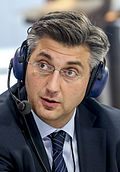| |||||||||||||||||||||||||||||||||||||||||
All 11 Croatian seats in the European Parliament | |||||||||||||||||||||||||||||||||||||||||
|---|---|---|---|---|---|---|---|---|---|---|---|---|---|---|---|---|---|---|---|---|---|---|---|---|---|---|---|---|---|---|---|---|---|---|---|---|---|---|---|---|---|
| Turnout | 25.24% | ||||||||||||||||||||||||||||||||||||||||
| |||||||||||||||||||||||||||||||||||||||||
European Parliament elections were held in Croatia on 25 May 2014. [1]
Contents
These were the second elections to the European Parliament in Croatia since the country's accession to the European Union was completed in 2013.
The country formed a single constituency, with members elected by proportional representation using open lists. [2]




